- Home
- Lise McClendon
Blackbird Fly Page 20
Blackbird Fly Read online
Page 20
“No! Not my bedroom!”
“If only I hadn’t closed off the ceiling.” Pascal’s eyes moved over her and she crossed her clammy arms over her chest. “But the window is open. And the chimney. It will escape.”
“Will it come back?”
He shrugged. “The loir is a harmless little creature. Nothing to be afraid.”
She sat on a dining chair, still shivering. “What did you call it?”
“A loir. You do not have them in the United States? It is cousin to the English dormouse.”
She shook her head, feeling droplets fling off the ends of her hair. If we had them in the U.S. she didn’t know about it, and didn’t want to know. She really should change out of these wet clothes. Her hands were stiff. Pascal disappeared then returned with a towel he wrapped around her shoulders. “Forgive me. You are the shivers.”
“Thanks.” She pulled the towel closer. “I think I — I — ”
“Wait here. I get you some dry clothes.”
“B-but.” But he was gone, up the stairs. To look through her drawers. And chase the loir out, she hoped.
He came downstairs with underpants, a sweatshirt, and jeans, then went outside into the garden. Stepping into the bathroom, she peeled off her wet things, dried roughly and pulled on the warm clothes. She dried her hair ends and rubbed her face. He had brought her underwear, plain, white cotton ones as if that was who he thought she was: a plain, white woman, slightly worn and a little baggy.
Holding her wet clothes in a ball, she stepped out outside. He was still here. Smoking a cigarette. He crushed it under his boot, picked up the stub and put it in his pocket. “Better?”
She threw her wet clothes over the clothesline. “Have you got another one of those?” He dug the pack of cigarettes out and lit her one. She smoked with jerks, hand to mouth then handed it back to him. “That’s enough.”
He crushed it under his boot like the other. “You are still cold? I can make chocolat chaud.”
Inside Merle climbed the stairs to get some socks and grabbed the blanket off her bed. In the kitchen he stirred milk in the saucepan. She sat on Tristan’s bed in the parlor, wrapped in the blanket. When had a man ever cooked for her, she wondered, as he handed her a mug of hot chocolate. “Did you make one for yourself?” He poured himself a cup from the saucepan and leaned against the doorframe.
“You make great cocoa. Thank you.” And you make great conversation, for a brain-dead person. “How is the work going upstairs?”
“Pas mal. I can stay and clean it up but tomorrow there may be more mess.”
“As long as I can get, you know, to my bed — my bedroom — my room.” Christ. Had her brain frozen? A racking shiver went through her.
He looked at her over the cocoa and then at the liquid in his mug. Merle drank, and finally got warm. He set down his cup on the stove. “I’ll see you tomorrow.”
“You don’t think the little thing, the — ?”
“Loir.”
“The loir will be back?”
“He is harmless. You will sleep all right?”
“Oh, sure. I guess.”
“Everyone has a loir now and then. It is very French.”
So she curled up, extremely French, under her covers, cursing in French to keep away rodents, listening for scratching noises, for claws on wood. Something on the roof woke her at three with its scritch/scritch; by five she called it quits and got up. She felt ridiculous and squeaky, like the silly blond in the old gothics who needed a man to protect her. That was not her.
“Only a fricking mouse,” she said loudly to the dust motes on the stairs, hoping to scare ‘le petit loir’ if he hid somewhere. The thought of things scampering over her in the night, and their little whiskers and teeth. Pascal hadn’t been afraid. But he wasn’t sleeping with rodents.
When the hardware store opened at eight o’clock she was there to ask about grills for her chimney, to keep out birds and small animals. The clerk showed her different sizes, all rather pricey. She had been expecting a piece of chicken wire but these were ornate affairs, ranging in price from twenty to sixty euros, depending on the strength of the iron bars and the number of curlicues.
What size was her chimney opening, they asked. She didn’t know. At home she made an espresso and set Albert’s ladder up against the house. The sun was rising over the hills to the east, sending golden rays from behind a bank of deep purple clouds. Halfway up she stopped to admire the sky. On top of the hill to the east, framed by sunrise, the big Château looked like Cinderella’s castle, with turrets and flags and shrubs sculpted into animal shapes. The wine-tasting tourists had asked her about it, was it worth the big price tag. She didn’t know a thing about it. Over there, still in shadow, was Château Gagillac where trucks were moving in and out around the tasting room. Loading wine? Would they schedule another tour? She did so miss Gerard’s scowling face.
Onward, skyward. She passed her bedroom window and kept going. Those shutters needed paint, badly. At the edge of the roof she stopped again. Pascal’s work was twelve or so feet to the left but she could see the new tiles, the patched spot. It looked good, blending in with the old tiles and secure from the weather. He hadn’t reset the gutter though. It hung, swinging loose.
She set her hand on the tile roof. The clay tiles were slick moss, and steeper than she imagined. Walking across them to the chimney was out of the question. Down she went, looking over her shoulder at the winery again. Now the big barn doors of the ageing room were wide open. A truck was backing into it. Maybe loading barrels to take to the commune.
As she lowered her foot to the next rung the ladder lurched to the left. A jolt of adrenaline snapped her to attention. She had been sightseeing from her perch when she should have been watching what she was doing. She looked down. One leg of the ladder was sinking in the wet dirt below. Her foot slipped but she hung on. Her heart beating in her ears, she waited for more sinking. She was ten feet off the ground and it would be nice to take the rest one rung at a time, thank you very much. Slowly she put a foot down on the next rung. The ladder sunk a little more, tipping west.
Quick or slow, that was the question. She eyed crash sites below, soft mud straight down where she’d washed the rug. Hard rocks of the path or gravel of the patio if she went left with the ladder. The ladder sunk a little more, tilting precariously. On the upper end, where the ladder touched the roof, the left leg was barely in contact with the gutter. Another inch and —
With a two-rung hop Merle pushed off the ladder, falling to her right hip and catching herself with her right arm. Her shin banged against the bottom rung and she cursed loudly. The ladder fell sideways out from under her flying feet, taking down some of the ripening pears as it fell. A loud peel as it clanged against the top of the wall resounded off the stone buildings like a church bell.
Blinking, her ears ringing, she sat up, covered with mud. An inventory of the body found a gash in the shin, rising already into a goose egg. She gingerly rotated her shoulder. It felt all right, despite falling on it. She felt her arm, her wrist. Sore but okay. She tried to stand. Pushing up with her right arm was painful. Not to mention the sore leg. She looked at her wrist again.
“Stupid. Stupid. Stupid,” she whispered angrily. This was the problem with being practical. You wanted to do everything yourself to save a few francs and ended up nearly killing yourself. Years ago, in the blush of home-ownership, she’d decided to hose out the gutters, climbing all over the roof, having a good ol’ time up in the air until Harry came home and told her she could have broken her neck. She could hear him right now, scolding her from beyond the grave.
“Oh, Harry.” She sat on the patio chair, pushing the ladder off it. “I wish I could say this is all your fault.”
Pounding at the back gate. “Merle?”
She pulled the key out from the chain around her neck and unlocked the gate. Moving her wrist to twist the key hurt; she switched to her left hand. Albert wore his usual uniform, the b
lue farmer’s coveralls.
“I hear the big boom.”
Her wrist was beginning to ache. “I might have broken something.”
He insisted she go see the doctor, leading her through the streets to the Cabinet du Medecin of Doctor Beynac. Merle played her role as careless child. An x-ray and exam later, she was fitted with a cast made of rolled gauze and some new material simulating the outdated plaster of yore. The doctor was very nice, even nicer because Albert was an old friend. He also checked out the shin gash, dabbed it and bandaged it up.
“Be careful now, ” Dr. Beynac said, wagging his plump finger. “You should not be doing these things. Is your husband not able to do these?”
“I am a widow, docteur.” A stupid, careless widow.
“That old ladder,” Albert muttered on the walk home. “I will get a new one. That one is bad, very old, very bad.”
Merle stood in front of her house, holding her cast across her waist with her good hand. This could be awkward, not having a right hand. The fingers could wiggle but they couldn’t reach her thumb. “The ground was soft. It went — ” She mimed the sinking ladder with her good arm. “Then I jumped off.”
“Mon Dieu. I am feeling terrible. And the worst of it is, I must use that ladder to pick my plums this week.”
She led him through the house into the garden where the ladder sat where she’d left it, leaning on the wall. “I hope it still works.”
Albert grumbled, angry with the ladder as he carried it over his head and then out the gate. What was she going to do about the chimney grate? Pascal stepped out the kitchen door.
“I began upstairs,” he said. “The door was unlocked. That is not a good idea, I told you, leaving doors unlocked, even in the daytime —” He stared at her cast. “What happened?”
“The ladder,” she said. “It toppled.”
“What were you doing on the ladder?” His dark eyes looked angry. “That is not for you to do.”
“So said the doctor. I was looking at the chimney. I want a grate over it. I think the loir came down that way.” She sighed. “I kept thinking about his little whiskers.”
She lay back on Tristan’s bed after Pascal went upstairs to work. No work for Merle today. Next door, in Yves and Suzette’s bedroom, the lace curtain blew out on the breeze. She opened her own window to feel the air and heard Yves’s voice, murmuring, and Suzette’s high-pitched laughter in response. Were they making love? A hand appeared and their window snapped shut.
Upstairs the hammering began. It sounded like the clatter of her heart.
Chapter 29
The room is dark and Virginia is tired. She’s been struggling with the baby for at a good half-hour and he won’t settle down. She’d found milk for it, then changed the diaper so she knew he was a boy. He wore rags, nothing more than strips of fabric wrapped around his strong young body.
Outside the noise has been muffled and gone out. That was so brief she thought maybe she dreamed it. But Weston came inside and told her the woman had run away. Without her baby, Virginia asked. It seemed unnatural. She had no business here, she was a squatter, a whore.
The baby tires of squirming and wailing, nestling into her shoulder. He is quite big, not walking yet so she thinks maybe a year old. She doesn’t know much of babies but this one is not a newborn. He is heavy and uses his hands well, grabbing her hair, her earrings.
Virginia looked into her purse earlier and found a few francs. Weston was busy in the back as she slipped out and bought milk and a loaf of bread. The baby quieted as she walked across the square.
But that was hours ago. Now he has awakened again, though it appears another sip of milk has calmed his fears. He looks at her with wide, startled eyes, as if she means him harm. Then his body loses the tension and he melts into her shoulder, rubbing his face on her dress.
Soon his breathing slows and he is sleeping. The quiet of room is deep. She rubs his little stiff back and he wiggles, sucking his thumb. Outside Weston is working. She knows better than to ask what he’s doing. She adores him but she knows the limit of his patience.
She strokes the baby’s cheek. Someone loved him, he is fat and adorable with black swirls of hair and big serious eyes that make love to her.
Weston is washing outside. She has never known him to be so industrious. He has sweated through his shirt, made his trousers filthy. She laughs at him, but he is in a black mood, angry about something. Probably having to work. He goes upstairs and comes down with a suitcase. He changes his shirt, brushes off his pants. He is ready to go.
Virginia bundles up the baby, finding a blanket, some diapers, the bottle of milk. Weston barks at her, what the hell? She insists, the baby must come. They can’t just leave him. No, he yells. Yes, she says again. He will be ours now. She holds him tight against her, perhaps too tight. He whimpers.
We’ll take him to the convent, Weston says. She holds him tighter. No, she says. We will call him Harold. My father’s name. He is ours now.
Chapter 30
In the morning the sun promised a hot day. Her wrist had ached all night and she scratched her forehead with the cast in her sleep. She was struggling with the espresso maker when Pascal arrived.
He brought cans of paint and bags of dry plaster along with plastic bags and a broom. She watched him mount the stairs with only a nod her direction. Could it be he was almost done? She’d gotten nothing done yesterday, the ache was so bad in her arm. Today work called out to her as if punishment for her stupidity.
Odile Langois called on the new cell phone. She’d gotten the number from Albert. Could she tour a group tomorrow? Oh, why not. She wouldn’t be painting. Merle wrote down the time with her left hand and hoped she could read it tomorrow.
The espresso wasn’t happening. She walked down to the square to buy a café au lait from a small bar where men stood even at nine in the morning and had a glass of wine or some eau de vie in their morning coffee. Merle hadn’t tried that unique concoction — a pear or plum liqueur, heavily alcoholic, that oldsters like Albert made at home. It looked like the white lightning of her youth.
She nursed her café au lait at a table on the sidewalk and made some phone calls. At least she could push buttons with the fingers on her bad arm. Arnaud Rancard was on vacation now. She called one of her colleagues at Legal Aid and tried to have a short conversation about getting a name of a homeless agency official in Bordeaux before she realized it was after midnight in New York and apologized. She dug out the phone number of the criminal lawyer in Bordeaux, and called. She explained to the secretary, at least she tried to explain, that she couldn’t come for an appointment, she had to stay in the village. Could Monsieur Lalouche call her on this number?
As she turned to signal for her check, she saw the old locksmith, Andre Saintson, at the bar. He leaned forward, barely upright, raising a cup to his lips. She gathered herself, bad arm and purse, and went inside.
“Bonjour, Monsieur. Comment allez-vous?” He frowned at her from under bushy eyebrows. “Merle Bennett,” she reminded him, and they shook hands. He did not comment on her cast, just shook the ends of her fingers.
“How is your house?” he asked.
“I tried to find you to open the garden gate. But I got it open. Someone gave me the key.” He nodded warily. “Remember the garden?”
The bartender, a round man with a three-day beard and black hair, wiped the bar and listened. She turned to him. “My garden is like the Tuilleries. Justine Labelle took great care of it.”
The man flinched. She said, “Did you know Justine?”
“Non,” he answered quickly, eyes darting at the other man at the bar.
“Did you know Justine Labelle?” she asked the stranger, a farmer by his looks. He threw down some coins and stalked out. She turned back to Andre. “Et vous?”
He sneered, nodding. “Une putain, a whore.”
“Where did she live before she came to my house?”
He lit a cigarette, taking his time. �
��I don’t know where.”
“Bordeaux,” offered the bartender. “So says Jean-Pierre.”
“Why did she come here? Did she just like this town?” Neither man commented. “Or for business?” The bartender leered and muttered something.
“Qui sais?” Andre mumbled. Who knows.
What had happened to him after he changed her locks? Had he been threatened by the gendarme? Or had he just decided to hang out in bars all day, avoiding her? She didn’t think she’d get an answer.
“It must have been disgraceful, having a putain here.” The bartender squelched a smirk. “Are there others? My husband’s parents would not have liked her living in their house. You, monsieur,” she said to the bartender. “Do you know anyone of the Chevalier family?” He said no. “The family gave the house to my husband’s mother. She was a Chevalier. Someone must know them.”
The bartender spoke rapidly to Andre who told her, “They all left town years ago, when he was a kid. Some kind of scandale. ”
“About what?”
Andre and the bartender talked so fast she hardly caught a word. Andre, who spoke slowly, said, “His mother was very upset. She was a friend of one of them and she never saw them again.”
“Does his mother still live here?”
“She died last winter.”
“Can you think of anyone who might remember the scandal?”
Andre smoked. The bartender had no ideas up his wine-stained sleeves.
“This town is full of old people. You must know someone who likes to wag his tongue.”
“Not many in this town.” Andre drained his cup. “How about your neighbor?”
“Madame Suchet? She’s not old enough to remember, is she?”
The bartender was glaring at the old man. “Perhaps not. You’re right. Too young.”
Merle held the small plum tart from the patisserie against her cast as she knocked on Madame Suchet’s door. The pear tart had broken the ice, she was hoping plums would continue the thaw.

 Blame it on Paris (Bennett Sisters Mysteries Book 7)
Blame it on Paris (Bennett Sisters Mysteries Book 7)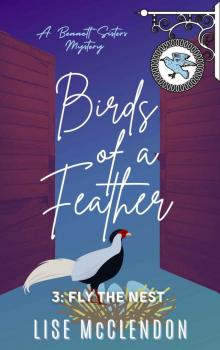 Birds of a Feather: 3: Fly the Nest (Bennett Sisters Mysteries Book 16)
Birds of a Feather: 3: Fly the Nest (Bennett Sisters Mysteries Book 16) Blame it on Paris
Blame it on Paris The Things We Said Today
The Things We Said Today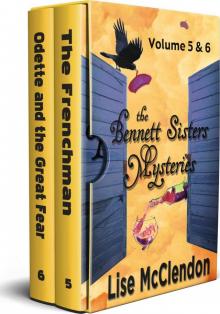 Bennett Sisters Mysteries Volume 5 & 6
Bennett Sisters Mysteries Volume 5 & 6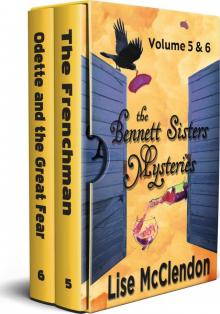 Bennett Sisters Mysteries Box Set 2
Bennett Sisters Mysteries Box Set 2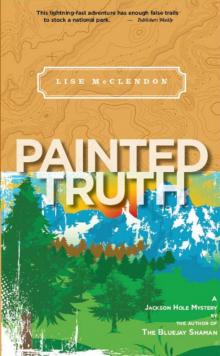 Painted Truth
Painted Truth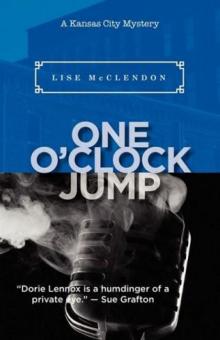 One O'Clock Jump
One O'Clock Jump The Bluejay Shaman (Alix Thorssen Mystery Series)
The Bluejay Shaman (Alix Thorssen Mystery Series) Swing Town Mysteries Dorie Lennox Box Set
Swing Town Mysteries Dorie Lennox Box Set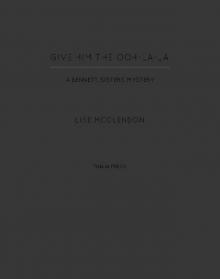 Give Him the Ooh-la-la
Give Him the Ooh-la-la Blackbird Fly
Blackbird Fly All Your Pretty Dreams
All Your Pretty Dreams Nordic Nights (The Alix Thorssen Mysteries)
Nordic Nights (The Alix Thorssen Mysteries)